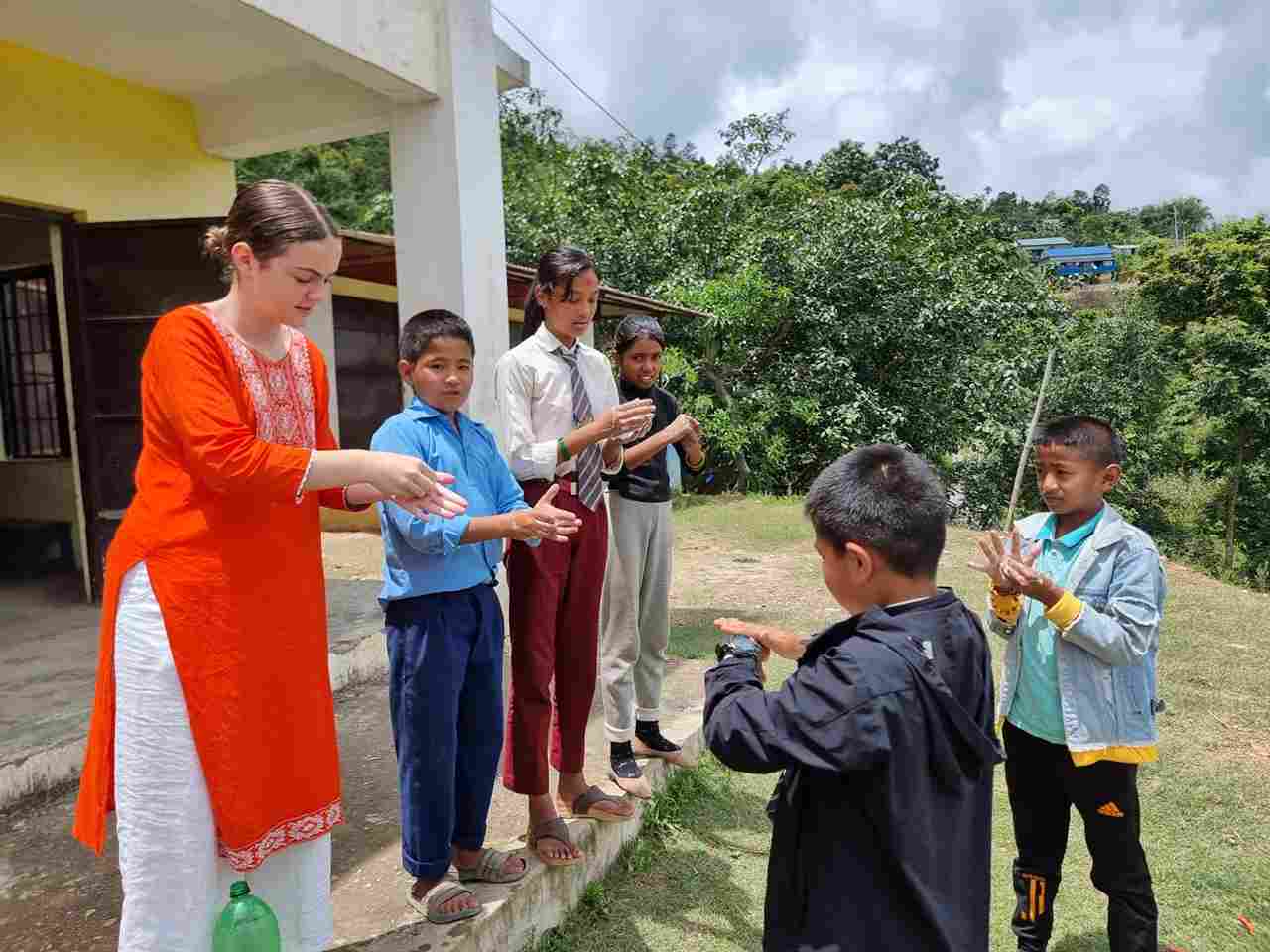Project Overview
Childcare Volunteer Abroad Programs in Nepal
| 📍 | Location | Outskirts of Kathmandu & Okhaldhunga |
| 📅 | Start Dates | Every 1st & 3rd Monday |
| ⏳ | Duration | 2 weeks to 10 months |
| ⏰ | Working Hours | 3-6 hrs/day, 5 days/week |
| 🏡 | Accommodation & Food | Stay with a host family or at a volunteer hostel |
| 👥 | Eligibility | Open to volunteers 18+, families, couples, & groups |
| 🛡️ | Safety & Support | 24/7 assistance & secure placements |
| 🎓 | Orientation | 2-3 days on arrival training |
| 🌏 | Weekend Travel | Explore festivals, temples, Himalayas, & immerse in culture |
| 💰 | Fees | Transparent; covers essentials.Click here to learn more |

Childcare Volunteer Abroad Programs in Nepal
Are you searching for childcare volunteer programs abroad that blend cross-cultural engagement with a transformative impact? Do you wish to volunteer with children abroad in a setting where your support truly matters? Our childcare volunteer opportunities in Nepal offer just that. You can help shape the emotional and developmental well-being of the country’s youngest and most vulnerable individuals by joining local orphanages, children’s homes, or community-based projects. With heartfelt mentorship, educational support, and a taste of Nepali culture, you can leave a lasting mark on these children’s futures—and they’ll certainly make a memorable impression on you as well.
Introduction
“Nurturing Futures” is our response to Nepal’s pressing need for specialized childcare volunteer opportunities, particularly among underprivileged or orphaned children. Our international childcare volunteering approach merges respect for local traditions with best-practice child development strategies. Whether you’re a student exploring volunteer teaching children overseas or a retiree seeking a meaningful second act, your presence invigorates educational play, mental health awareness, and stable attachments that children desperately crave.
Background
Historically, Nepal has endured challenges like poverty, earthquakes, and political transitions, often leaving children with disrupted education or limited guardianship. Although local communities strive to address these issues through small orphanages, day-care centers, and after-school clubs, resources remain tight. Government data indicates that nearly 16,000 children live in orphanages, with 85% not necessarily “true orphans” but from families too financially strained to provide care. As a result, reliable child development volunteer programs or volunteering in children’s homes abroad frameworks are critical. Volunteers with diverse skill sets help tailor academic classes, emotional support, and enrichment activities to help children flourish despite difficult beginnings.
Key Objectives
- Educational Support: Reinforce basic literacy, numeracy, and language skills for children who face academic gaps.
- Emotional Well-Being: Provide consistent attention, care, and mentoring to build trust and resilience among young minds.
- Skill Enhancement: Offer “early childhood education volunteering” modules for preschoolers, basic IT classes for older kids, or vocational guidance for teens.
- Community-Building: Encourage local guardians and staff with new teaching methods or organizational strategies, ensuring improved child-focused care.
The Need
Nepal’s diverse topography and socioeconomic realities compound challenges for vulnerable children. Many face malnutrition, lack of stable adult supervision, or minimal academic stimulation. A 2020 UNICEF report highlights that 30% of Nepal’s children are stunted by undernourishment, and 40% do not complete primary schooling. This underscores the urgent demand for robust childcare volunteer abroad programs that complement local efforts, bridging existing gaps in resources and staff.
Global Relevance
From the vantage point of the UN Sustainable Development Goals, especially SDG 4 (Quality Education) and SDG 3 (Good Health and Well-being), addressing the needs of underprivileged children fosters sustainable social and economic development worldwide. You bolster these objectives by championing volunteering with children abroad in Nepal, ensuring each child’s right to education, care, and a stable future.
Local Voices
“Before volunteers arrived, we managed our orphanage with two staff for thirty kids. Their help has made an incredible difference—teaching songs, checking homework, and organizing health check-ups. The children are happier and learn faster.” – Kamala, caretaker at a children’s home near Pokhara.
Below are 10 core tasks that you may undertake in these childcare volunteer opportunities:
- Assist in Classrooms: Provide direct tutoring or volunteer teaching children overseas—covering English, math, arts, or basic computing.
- Coordinate After-School Programs for Low-Income Youth: Set up engaging group games, reading circles, or skill-building clubs.
- Offer Emotional and Social Support: Through one-on-one conversations or group bonding sessions, serve as a prominent brother/sister figure to children needing stable adult guidance.
- Engage in Life Skills Activities: Organize interactive workshops in hygiene, personal safety, or conflict resolution.
- Arrange Sports Activities: Oversee friendly competitions or weekly sports gatherings, which are integral for physical development.
- Host Arts and Crafts Workshops for Teens: Spark creativity in older kids, letting them express themselves through painting, drawing, or handicrafts.
- Foster Youth Mentorship Volunteer Programs: Encourage older or senior children to mentor younger peers, creating a cycle of positivity and communal support.
- Support in Children’s Hospitals (If Relevant): Some volunteers can help bed-bound youths by reading stories or assisting medical staff in simple tasks.
- Advocate for Special Needs Childcare Volunteering: Offer personalized attention to children with disabilities or learning difficulties, bridging specialized resources from your home country.
- Participate in After-School Program Volunteering Abroad: Plan weekend educational outings or library sessions, broadening the children’s worldview.
A typical day in international childcare volunteering might look like this:
- 08:30 – 09:15: Breakfast at a volunteer house or local homestay
- 09:15 – 10:00: Commute or walk to the children’s home, day-care center, or local school
- 10:00 – 13:00: Assist morning classes, plan or facilitate group activities, help with feeding or child supervision
- 13:00 – 14:00: Lunch break, often dal bhat (rice-lentil staple) or simple local fare
- 14:00 – 16:00: Oversee after-lunch tutoring, reading sessions, or extracurricular workshops (like music, crafts)
- 16:00 – 17:00: Return to your lodging
- 17:00 – 18:00: Free time for reflection, cultural immersion, or personal errands
- Holiday Camps: If you’re staying through major Nepali festivals or school breaks, coordinate short “fun” intensives, such as dance classes, drama rehearsals, or environmental outings.
- Micro-Fundraising: Some volunteers help local staff create micro-campaigns for supplies or child scholarship support, bridging local families with external donors.
Required Skills
- Patience & Adaptability: Children can be unpredictable. A calm spirit and flexible approach ensure positive daily experiences.
- Communication: Basic English is typically enough, especially if local staff or older kids can translate for younger ones.
- Willingness to Help: Children’s routines involve meals, chores, or study sessions. Volunteers who dive in wholeheartedly have the most significant impact.
Eligibility
- Age: Usually 18+ (or 16+ with special guardian arrangement).
- Time Commitment: At least two weeks is recommended; deeper relationships form with extended stays.
- Documentation: Valid passport, recommended travel insurance, and necessary visa compliance for volunteering in Nepal.
Preferred Skills
- Teaching / Child Development Experience: Great for designing lesson plans or leading group games.
- Arts & Crafts / Sports: Kids love creative expression and active play. If you can lead an art circle or sports day, your efforts can significantly amplify engagement.
- Cultural Sensitivity: A willingness to respect local norms, celebrate festivals, and adapt to communal lifestyles fosters stronger acceptance.
Cultural Immersion
Volunteers in Volunteer in Children’s Homes Abroad not only assist kids but also:
- Dive into Festivities: From Tihar (festival of lights) to Dashain (Nepal’s biggest festival), you’ll see joy, traditions, and familial unity up close.
- Savor Local Cuisine: Expect daily dal bhat, freshly grown vegetables, and sometimes spicy pickles. You can also try momos or “chiura” (beaten rice).
- Homestay Family: Some volunteers prefer living with a Nepali family, forging deeper cross-cultural ties through mealtime chats and shared chores.
Language Learning
- Nepali Basics: Greet “Namaste,” express gratitude with “Dhanyabad,” quickly forging warmth with local staff and children.
- Daily Practice: Over time, you might pick up more straightforward phrases or read basic Devanagari script, boosting your sense of cultural belonging.
Accommodation
- Volunteer House: Typically dorm-style living with fellow volunteers, communal areas for bonding or free time.
- Homestay: Private or shared rooms with local hosts give an intimate view of Nepali family life.
Meals
- Nepali Standard Meals are usually two or three daily: dal bhat (lentils, rice), vegetables, occasional meat, or fish.
- Diet Requests: Vegetarian or specialized diets are typically honored with prior notice.
Transportation
- Airport Pickup: Coordinators often greet volunteers at Kathmandu’s Tribhuvan International Airport.
- Commute: Public buses, shared taxis, or walking if project sites are nearby. The staff clarifies your daily route.
On-Site Support
- Coordinators: Provide orientation, address safety or cultural queries, and ensure tasks meet local children’s needs.
- Local Partnerships: Orphanages, childcare centers, or after-school clubs integrating volunteer roles into daily child routines.
Health and Safety
- Vaccinations: Consult a physician about recommended immunizations before traveling to ing Nepal.
- Insurance: Travel/health coverage is wise for any unexpected scenarios.
- Emergency Protocol: Our staff maintains close relationships with local health clinics for urgent situations.
For detailed costs, see our Program Fees page. Typically, fees cover:
- Accommodation (volunteer house or homestay)
- Meals (local Nepali diet)
- Orientation and staff support
- Basic project materials for daily child engagement
Not included: flights, personal insurance, visa fees, or optional tours.
Volunteer Impact
- Personal Fulfillment: You see direct transformation as kids develop academically, socially, and emotionally under your supportive presence.
- Professional Experience: Gaining real-life insights into child development volunteer programs can boost future careers in education, social work, or philanthropic leadership.
- Global Perspective: You form cross-cultural friendships, adopting empathy and a better appreciation for resource-limited settings.
Community Impact
- Enhanced Childcare Quality: Consistent volunteer presence ensures that children receive more personalized attention, creative lessons, and moral guidance.
- Strengthened Local Staff: Volunteers often share new teaching methods or organizational tips, leaving a more efficient, child-friendly environment behind.
- Long-Term Aspirations: Exposing children to broader possibilities expands their academic or career horizons, lessening cyclical poverty.
Statistic: A 2021 study by a Nepali child welfare NGO found that homes with consistent international volunteer involvement reported a 25% increase in academic performance among resident children.
Success Stories and Testimonials
Volunteer Experiences

Maria

John
Local Impact Stories


Sushma
Application Process
Ready to inspire and empower? Follow these steps to join our “Nurturing Futures – Childcare Volunteer Abroad Programs”:
- Complete the Online Application: Visit VolunteeringNepal.org/apply-now with your details and interests.
- Submit Your Resume: Provide a CV plus two references (academic and professional).
- Await Confirmation: Our team will email acceptance details and orientation resources.
- Pay the Booking Fee: A €150 deposit ensures logistical planning for your arrival and tasks.
- Receive the Pre-Departure Pack: Access cultural insights, safety tips, and teaching strategies.
- Final Payment: Settle the rest upon arrival or via wire transfer to confirm your spot.
FAQ’s
Not necessarily. Enthusiasm, compassion, and readiness to engage kids matter most. Staff guide you in child-friendly methods, bridging any skill gaps.
Typically, children from toddlers up to older teens—though the focus may vary by specific orphanage, daycare, or after-school club.
Yes. Some programs handle special-needs children. Let us know your background so we can align you with the right environment for maximum impact.
Nepal is generally welcoming. We ensure safe accommodations, thorough orientation, and staff support, ensuring a constructive environment for all volunteers.
Potentially. We may coordinate a shared schedule across different centers if logistics and staff capacity permits.
Many older children learn basic English, plus local staff or bilingual teens help interpret. You can also pick up simple Nepali phrases along the way.
Absolutely. Some volunteers remain in remote contact, sponsor supplies, or fund scholarships. Ongoing involvement fosters continuity and deeper relationships.
Join Us Today to Make a Difference!
Your dedication can reshape the futures of some of Nepal’s most disadvantaged youth. Through Childcare Volunteer Abroad Programs, you provide daily care, educational impetus, and emotional warmth. You actively respond to their crucial need for supportive adults by bridging cultures and forging lasting, powerful bonds.
- Volunteer: Dive into day-to-day routines, tutoring kids, planning craft sessions, or leading sports clubs.
- Intern: Merge your social work, childhood education, or psychology field studies and gain hands-on application in a living classroom.
- Donate: Contribute to facility upgrades, resource expansions, or scholarships for older teens seeking advanced studies.
- Share: Encourage family, friends, or social networks to get involved, magnifying your ripple of transformation.
Leap. Apply Now or contact support@vin.org.np to start your journey. Become the guiding force in these children’s stories, weaving them a brighter, more hopeful tomorrow.
